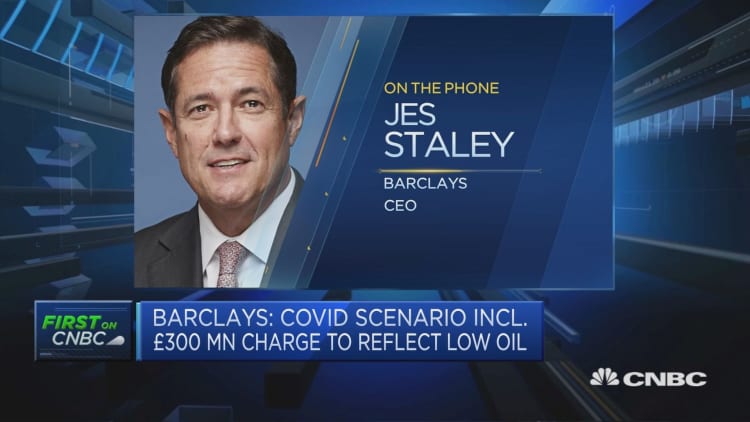
Barclays on Wednesday reported a 42% fall in first-quarter net profit year-on-year and opted to take a £2.1 billion ($2.62 billion) credit impairment charge, as it attempts to anticipate the fallout from the coronavirus pandemic.
The British bank posted net profit attributable to shareholders of £605 million for the first three months of the year, down from £1.04 billion for the same period last year.
In the statement released Wednesday, Barclays said its credit impairment charge "reflects our initial estimates of the impact of the COVID-19 pandemic."
Barclays CEO Jes Staley told CNBC Wednesday that the impairment charge was "very high" as it primarily used credit models used for the bank's consumer business and was based on a "very harsh" economic scenario in terms of unemployment for the year and in terms of GDP (gross domestic product).
"Ultimately we ended up with a 5.1% ROTE (return on tangible equity) and a profitable quarter, so we feel good about how conservative we were," Staley added.
Here are the key highlights for the quarter:
- Operating expenses held at £3.3 billion, roughly the same as the first quarter of 2019.
- The closely-watched common equity tier one (CET1) capital ratio rose slightly to 13.1%, up from 13% in the first quarter of 2019.
- Return on tangible equity slid to 5.1%, versus 9.2% for the same period last year.
- Group pre-tax profit was £913 million, down 38% from $1.48 billion in the first quarter of 2019.
Group income rose by 20% year-on-year to £6.3 billion, driven by a strong performance in Barclays Corporate and Investment Bank (CIB) on the back of higher trading volumes. The bank's FICC (fixed income, currencies and commodities) income jumped 106% year-on-year to £1.86 billion.
"Our consumer business was softer because of what was going on with the economy, but that was compensated for by a very robust corporate and investment bank, particularly the investment bank," Staley told CNBC.
"I think one of the healthy things that we have seen in response to this virus attack has been the recovery in the capital markets, the amount of issuance and financing that has been going on there."
The economic impact of the coronavirus crisis follows a prolonged period of macroeconomic uncertainty surrounding Brexit and the global trade environment, which has weighed on Barclays' earnings in previous quarters.
The bank announced earlier this month that it would scrap its dividend and suspend share buybacks following pressure from the Bank of England.

